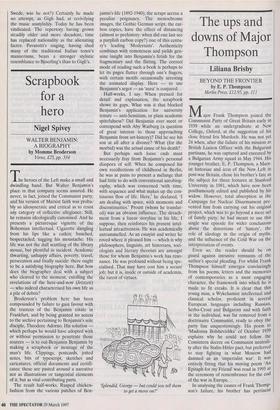Scrapbook for a hero
Nigel Spivey
WALTER BENJAMIN: A BIOGRAPHY by Momme Bmderson Verso, £25, pp. 334 he heroes of the Left make a small and dwindling band. But Walter Benjamin's place in that company seems assured. He never, in fact, joined the Communist party; and his version of Marxist faith was proba- bly so idiosyncratic and critical as to resist any category of collective allegiance. Still, he remains ideologically canonised. And he presents a picturesque vignette of the Bohemian intellectual. Cigarette dangling from his lips like a catkin; hunched, bespectacled, tugging his moustache. His life was not the dull scuttling of the library mouse, but plentiful in incident. Academic thwarting, unhappy affairs, poverty, travel, persecution and finally suicide: there ought to be a satisfying biography here. But how does the biographer deal with a subject who cleaved to the moment, extolling the revelations of the here-and-now (Jetztzeit) — who indeed characterised his own life as a pile of debris?
Broderson's problem here has been compounded by failure to gain favour with the trustees of the Benjamin estate in Frankfurt, and by being granted no access to the archive pertaining to Benjamin's sole disciple, Theodore Adorno. His solution — which perhaps he would have adopted with or without permission to penetrate those sources — is to out-Benjamin Benjamin by making a scrapbook or montage of the man's life. Clippings, postcards, jotted notes, bits of typescript, sketches and caricatures, official documents and certifi- cates: these are pasted around a narrative not as illustrations or tangential elements of it, but as vital contributing parts.
The result half-works. Rusped chicken- fashion from the various patches of Ben-
jamin's life (1892-1940), the scraps accrue a peculiar poignancy. The monochrome images, the Gothic German script, the car- bon copies, have the effect of distancing (almost to prehistory: when did one last see a purplish carbon copy?) one of this centu- ry's leading 'Modernists'. Authenticity combines with remoteness and yields gen- uine insight into Benjamin's fetish for the fragmentary and the flitting. The correct mode of reading such a book is perhaps to let its pages flutter through one's fingers, with certain motifs occasionally arresting the animated display. Here — to use Benjamin's argot — an 'aura' is conjured.
Half-works, I say. When pressed for detail and explanation, the scrapbook shows its gaps. What was it that blocked Benjamin's application for university tenure — anti-Semitism, or plain academic spitefulness? Did Benjamin ever meet or correspond with Aby Warburg (a question of great interest to those approaching Benjamin from art-history)? Did he see his son at all after a divorce? What (for the morbid) was the actual cause of his death?
But perhaps such loose ends must necessarily fray from Benjamin's personal diaspora of self. When he composed his own recollections of childhood in Berlin, he was at pains to present a mélange that had little to do with conventional autobiog- raphy, which was concerned 'with time, with sequence and what makes up the con- tinuous flow of life. Here,' he declared, 'I am dealing with space, with moments and discontinuities.' Proust (whom he translat- ed) was an obvious influence. The detach- ment from a linear storyline in his life, I suppose, then reinforces his present intel- lectual attractiveness. He was academically untrammelled. As an essayist and writer he roved where it pleased him — which is why philosophers, linguists, art historians, soci- ologists and literary theorists are amongst those for whom Benjamin's work has reso- nance. He was profound without being spe- cialised. That may have cost him a secure job; but it is, inside or outside of academia, the rarest of virtues.
'Splendid, George — but could you tell them to get a move on?'


































































 Previous page
Previous page